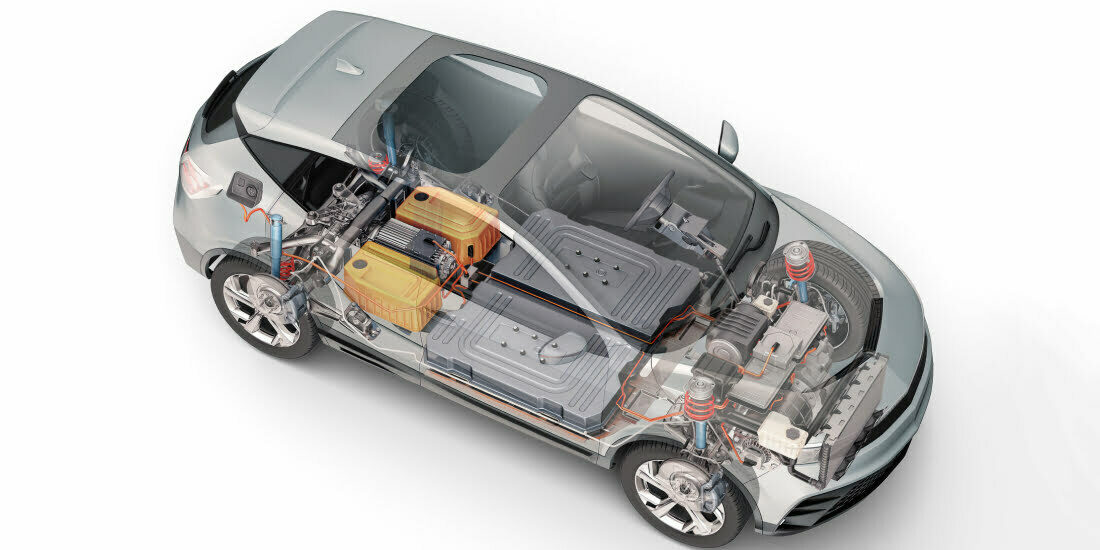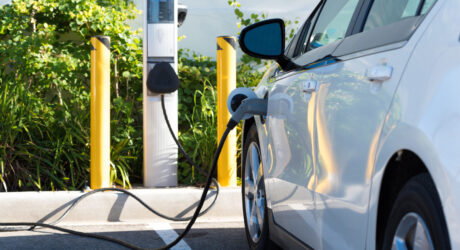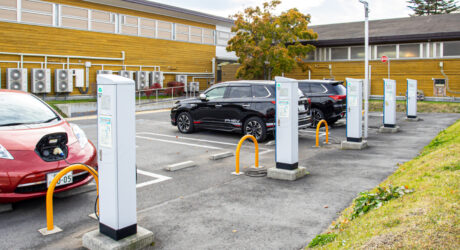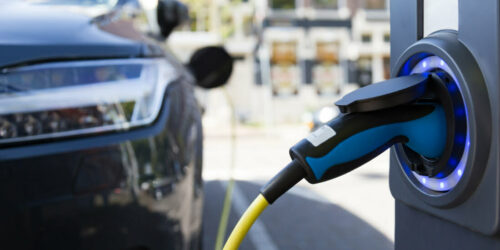How Long Do Electric Car Batteries Last?
- Batteries can last 10-20 years
- They typically degrade around 2.3% every year
- Fast charging can decrease battery lifespan
If you are considering buying an electric vehicle (EV) and want to know about electric car battery costs, this article is for you. Many people show an interest in investing in an electric car but are wary of paying out too much for an electric car battery. In this article, we’ll discuss electric car battery expenses so you can reach an informed decision on whether this style of motoring is right for you and your current circumstances. Find out more about electric car battery costs and how long you can expect your EV battery to last.
Interested in an EV charger? Use our quote comparison tool to find out how much you'd pay. It only takes a minute.

What's On This Page?
Click the links below and head straight to a specific section of the article.
- Electric Car Battery Cost
- When Will I Need To Replace My Electric Car Battery?
- Why Might My Electric Car Battery Degrade?
- Will My Electric Car Battery Come With a Warranty?
- Can I Cut Electric Car Battery Costs by Prolonging The Life of My Battery?
- How Risky is Fast Charging?
- What Else Can I Do To Protect My Battery?
- How Can I Safely Store My Electric Car and Protect The Battery?
- When Should I Replace My Electric Battery?
- What Are Typical Electric Car Battery Costs?
- Conclusion
Electric Car Battery Cost
Electric cars have become incredibly popular over the past few years. This isn’t just because of the way they are much cheaper to run than their traditional petrol and diesel-based counterparts but also due to the way they enable us to cut our carbon footprint. There are various government incentives attached to buying an electric car, and you can also avoid the London congestion charge and road tax when you use this kind of vehicle. However, many people still worry that they won’t be able to stretch to electric car battery costs if they do make the switch to electric-based motoring.
When Will I Need To Replace My Electric Car Battery?
Although electric cars can reduce your daily motoring costs dramatically and require relatively little maintenance, you will need to replace the battery at some point if you do invest in an EV. Depending on how much you use your EV and what model you opt for, you will need to replace your battery after 10-20 years. Factors that will influence when you need to change your battery include your charging method, how many charging cycles the battery goes through and what your mileage is.
Why Might My Electric Car Battery Degrade?
Electric car batteries are based on lithium-ion technology. This is the same kind of technology your smartphone battery is built around. Over the years, there have been many advancements in lithium-ion technology. This means these batteries can now last for much longer than they once did. The size of your EV battery will also determine how long it lasts. Studies suggest that a typical EV battery degrades by around 2.3% every year. Your battery will slowly start to degrade from the moment the manufacturing process is complete.
The more your battery degrades, the lower your EV’s range will be. If you have a vehicle with a range of 300 miles, you should still be able to travel around 230 miles after a decade. The term ‘range’ in this context means the number of miles you can drive for before you need to recharge your vehicle’s battery. Once your battery reaches around 70% efficiency, it is considered to be at the end of its life by most manufacturers.
Despite needing to replace your EV battery, in terms of fuel, EVs have the least amount of efficiency loss of any fuel type. According to data from CleanTechnica, an EV only loses about 27% of its efficiency from the point of generation to the point of use. Hydrogen fuel cells lose around 78% across a more intense process, with 26% lost through transport and storage alone. The lease efficient fuel type is power to liquid, which is usually in reference to liquid hydrogen vehicles. A staggering 87% efficiency is lost before it's even used. You can see how these fuel types compare in the interactive graph below.
Will My Electric Car Battery Come With a Warranty?
All EV manufacturers offer warranties with their batteries. These warranties tend to last for around eight years. This means you may still be covered by the battery warranty even if you buy a second-hand electric car. Some manufacturer warranties are based on mileage rather than time, and it’s also common for people to be covered for their first 100,000 miles of motoring. As long as your battery is covered by a warranty, you should be able to have it repaired or replaced if you do spot a fault with it.
Can I Cut Electric Car Battery Costs by Prolonging The Life of My Battery?
There are several steps that you can take if you want to make your battery last for as long as possible. If you want to cut electric car battery costs and get more years out of your battery before you need to replace it, you can take the following steps:
- Avoid plugging your car in every time you get the opportunity. This is likely to put unnecessary stress on the battery, so only charge it when you actually need to. See our guide to electric vehicle charging
- Don’t let your battery drain completely. If your battery does go completely flat, the cells will be damaged and the overall capacity will be reduced
- Don’t drive too aggressively. If you do have an aggressive motoring style, it’s best to change this. This kind of driving can cause your battery to discharge quicker than it needs to whilst heating it up. Aggressive motoring will reduce the maximum capacity of your battery
How Risky is Fast Charging?
If you have been searching for information about electric car battery costs, you may also be wondering about the impact of fast charging. Many people are interested in using “fast-charging” facilities” for convenience reasons. However, you may be shortening the lifespan of your battery if you opt for a fast charging solution. If you do decide to use a fast charger anyway, it’s best to avoid charging your battery above 80% capacity. Those that regularly use fast chargers risk prematurely decreasing the total capacity of their batteries.
What Else Can I Do To Protect My Battery?
One of the best ways to reduce electric car battery costs and keep your battery functional for longer is to keep it charged between 20% and 80%. Pod Point suggests electric cars rarely need to be fully charged. You should only charge your battery to 100% if you are planning a long trip and need to do so. If you let your battery fall below 20% regularly, the total capacity will drop over time. One way to avoid going over 80% is to use a charging point that allows you to set the maximum percentage you want your battery to charge to.
How Can I Safely Store My Electric Car and Protect The Battery?
If you need to store your electric car away for a while, keep the battery charged to around 50%. This can prevent battery cell damage. If your battery remains at an extreme temperature for a long period of time, you could be risking its efficiency. Store your EV in a cool area if you can. Although it will lose a small amount of power, you can expect the battery to last for several months before it goes flat.
When Should I Replace My Electric Battery?
If you are concerned about electric car battery costs but need to know when the right time to replace your battery is, read on. Some manufacturers suggest replacing your battery when it has reached a 70% efficiency level, though others say you may wait until it falls to 60%. Although these figures may seem high, lithium-ion batteries don’t tend to hold their charge very effectively once they reach these levels. This means you can expect their capacity to fall much quicker than normal when you are driving your EV. If you’re not sure how close your battery is to the end of its life, you can go to a dealer for a battery health check.
What Are Typical Electric Car Battery Costs?
The price that you’ll need to pay to replace your electric car battery will depend on various factors. These include the make and model of your EV. Studies suggest that EV owners tend to pay around £4,500 for new batteries on average. Although electric car battery costs per kWh currently stand at around £105, it’s likely that this figure will fall substantially over the coming years. Some batteries even boast a modular design, and this means motorists are able to simply replace the damaged cells rather than the whole battery pack. If you have this kind of battery, you could electric car battery costs by taking advantage of this.
Conclusion
Electric car battery costs may still seem rather high, but it’s very likely that they will continue to fall in time as more and more motorists embrace this kind of driving and further technological advancements occur. There are many things you can do if you do want to prolong the life of your battery so you don’t even need to think about electric car battery costs for many years. You can even lease batteries from some manufacturers so you don’t need to pay for one outright. You may even decide to simply buy a new electric car when your battery reaches the end of its life to avoid worrying about electric car battery costs. You could also consider recycling your battery once it reaches 60-70% capacity so you can make an additional contribution to the environment.
Car manufacturers and waste disposal companies have been busy developing methods to recycle thousands of electric car batteries. Although fewer than 5% of the lithium-ion batteries are currently being recycled, this figure is likely to become much higher as electric-based motoring becomes the norm around the world. In any case, you can expect your car battery to last 10-20 years depending on how well you treat it and how many miles you drive during its life.
Related articles
View all EV charging articles
A Guide to Electric Car Batteries

EV Home Charger Installation Guide: How to Charge an EV at Home

OZEV Grant: What Is It and Am I Eligible?

The Best Apps for Finding EV Charging Stations

Electric Car Home Charging Stations: The Top Ten EV Chargers for Your Home

Should I Buy a Used Electric Car?

Electric Vehicle Range







